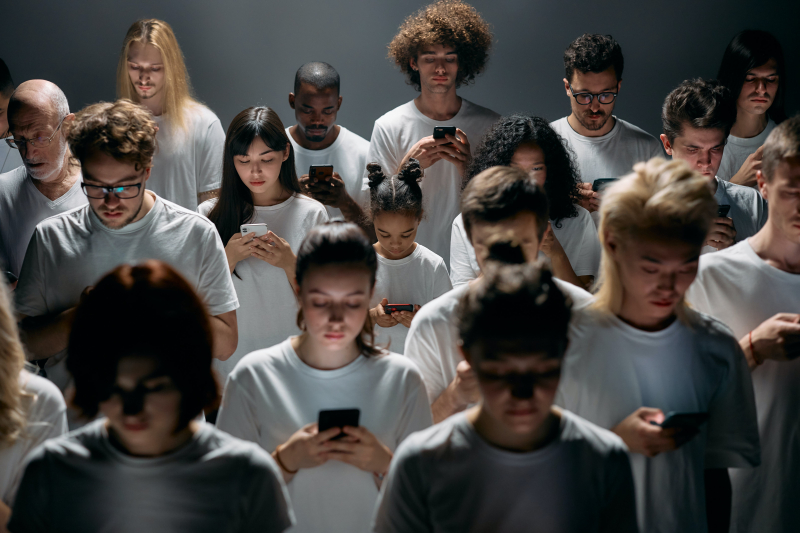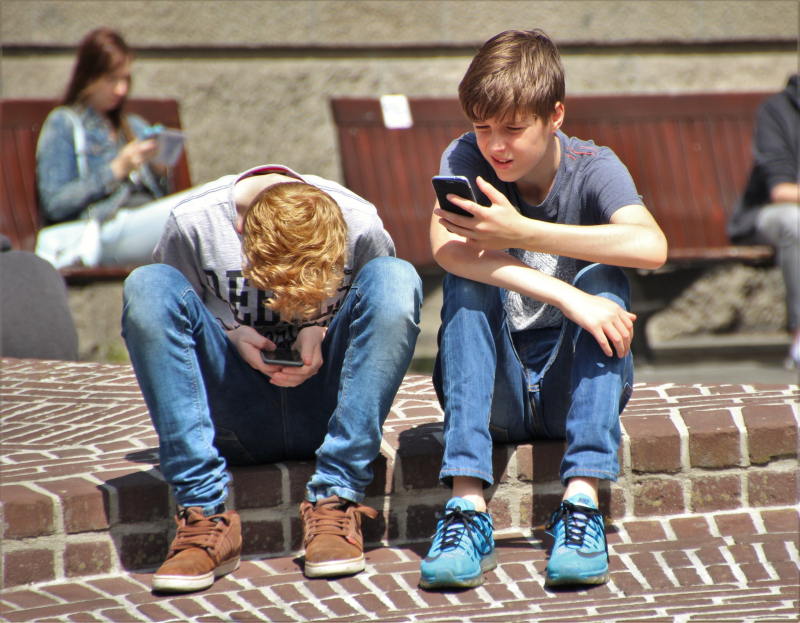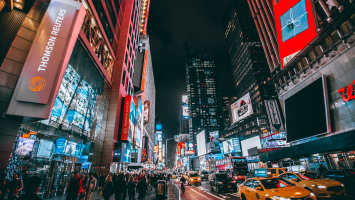Top 10 Cause and Effect Essay Topics on Social Media and Samples
This article delves into the top 10 cause-and-effect essay topics on social media, providing a comprehensive examination of the societal, psychological that ... read more...shape and are shaped by our online presence.
-
Essay topic: The Cause and Effect of Social Media Addiction
Answer:
In the contemporary digital age, the prevalence of social media has surged, bringing with it the burgeoning concern of social media addiction. Social media platforms offer a continuous stream of information, validation through likes and comments, and the semblance of staying connected with a vast network of individuals. Consequently, users find themselves drawn into a cycle of compulsive checking, creating a dependency that can have profound effects on various aspects of their lives.
The primary effect of social media addiction is the erosion of real-world relationships. As individuals become engrossed in their online personas, the time and emotional energy invested in face-to-face interactions diminish. This detachment from the physical world can lead to a sense of isolation, affecting personal relationships, work dynamics, and overall well-being.
Additionally, the addictive nature of social media can disrupt sleep patterns, contributing to a decline in mental health. The incessant need to stay connected, even during nocturnal hours, results in sleep deprivation, heightened anxiety, and diminished cognitive function.
Moreover, social media addiction has implications for productivity and academic performance. The constant distraction of notifications and the allure of scrolling through timelines can impede concentration and focus. As a consequence, individuals may find themselves procrastinating on essential tasks, leading to a decline in productivity. In academic settings, this can manifest as reduced study time, lower grades, and a compromised educational experience.
Also, social media addiction significantly harms mental well-being, causing stress, anxiety, and low self-esteem through constant social comparison. The fear of missing out amplifies these effects, emphasizing the urgent need to address mental health repercussions for a balanced and fulfilled society.
In conclusion, the causes of social media addiction are rooted in the desire for constant connectivity and instant gratification. The effects, however, extend beyond the digital realm, impacting real-world relationships, mental health, and productivity. As society grapples with the pervasive influence of social media, it becomes imperative to strike a balance between online engagement and the preservation of a healthy, fulfilling offline life.

Photo by Ketut Subiyanto via pexels 
Photo by cottonbro studio via pexels -
Essay topic: The Cause and Effect of Online Cyberbullying
Answer:
Online cyberbullying, a growing concern in the digital age, is primarily fueled by the anonymity provided by digital platforms. This anonymity allows perpetrators to engage in harmful behaviors without immediate consequences, creating an environment conducive to the escalation of cyberbullying incidents.Online cyberbullying is primarily fueled by the anonymity granted by digital platforms, as well as the increasing reliance on social media for communication and validation. The lack of immediate consequences on these platforms allows perpetrators to engage in harmful behaviors, while the pursuit of attention and recognition intensifies competition, leading to jealousy and cyberbullying.
Another contributing factor to online cyberbullying lies in the blurred boundaries between personal and online life. As individuals share more aspects of their daily lives on social media, personal conflicts can easily spill into the digital realm. Disputes that may have remained confined to face-to-face interactions now have the potential to escalate into online harassment, perpetuating a cycle of negativity. The integration of personal and online spaces amplifies the impact of disagreements, providing another avenue for the manifestation of cyberbullying behaviors.
The ease of access to digital communication platforms, coupled with a lack of oversight, serves as a fundamental cause of online cyberbullying. The effects of online cyberbullying are profound and devastating, impacting victims emotionally, mentally, and socially. Victims often experience heightened stress, anxiety, and depression due to the relentless nature of online attacks. The virtual nature of cyberbullying intensifies its toll, trapping victims in a cycle of victimization. Socially, victims may face isolation and strained relationships.
One significant effect of online cyberbullying is its impact on academic performance. The emotional distress caused by persistent online attacks can lead to a decline in academic achievements, hindering the victim's ability to focus on their studies. The consequences may extend to long-term psychological harm, with some cases linked to self-harm and suicidal ideation.
To address online cyberbullying, a multifaceted approach is necessary. Education on responsible online behavior and the potential consequences of cyberbullying is crucial. Additionally, fostering a supportive environment that encourages reporting and intervention is essential for mitigating the impacts. Only through concerted efforts can society hope to create a safer digital space and protect individuals from the far-reaching effects of online cyberbullying.

Photo by Andrea Piacquadio via pexels 
Photo by Andrea Piacquadio via pexels -
Essay topic: The Cause and Effect of Identity Theft While Using Social Media
Answer:
As our lives become increasingly intertwined with digital platforms, from online banking to social media, the risk of unauthorized access to personal information escalates. This essay explores the causes and effects of identity theft, shedding light on the multifaceted repercussions that extend beyond the individual, affecting the fabric of trust in digital systems and economic stability.The primary cause of identity theft is rooted in the extensive reliance on digital platforms for personal and financial transactions. As individuals share sensitive information online, such as social security numbers and banking details, cybercriminals exploit vulnerabilities in security systems, gaining unauthorized access to steal identities. The sophistication of hacking techniques and the continuous evolution of cyber threats contribute to the ease with which personal information can be compromised, making individuals susceptible to identity theft.
The proliferation of identity theft is also driven by the escalating sophistication of cybercriminal tactics and the extensive sharing of sensitive personal information on digital platforms. As individuals engage in online transactions and activities, the vulnerabilities in security systems become opportunities for hackers to gain unauthorized access, leading to the theft of valuable personal data such as social security numbers and financial details.
The effects of identity theft are far-reaching, encompassing financial losses and emotional distress for victims. Financially, unauthorized access to bank accounts and the misuse of personal information result in significant monetary losses. Emotionally, individuals grapple with feelings of violation and anxiety. Reclaiming one's identity often entails a laborious process of legal procedures and interactions with financial institutions, adding to the overall burden on victims and eroding trust in digital systems.
Furthermore, the consequences of identity theft are profound, encompassing both personal and financial realms. Financially, victims often face substantial losses as cybercriminals exploit stolen identities for fraudulent transactions and unauthorized access to bank accounts. The societal effect is also notable, as identity theft erodes trust in digital systems, potentially hindering the growth and innovation of digital economies.
In conclusion, identity theft is a complex issue with wide-ranging impacts, necessitating a comprehensive approach to fortify cybersecurity measures and educate individuals on safeguarding their personal information. By addressing the root causes and understanding the far-reaching effects, society can work towards creating a safer digital environment that balances convenience with the protection of personal identities.
Photo by lil artsy via pexels 
Photo by lil artsy via pexels -
Essay topic: The Cause and Effect of Personality Disorders While Using Social Media
Answer:
The integration of social media into daily life has become pervasive, providing individuals with unprecedented avenues for connection and self-expression. However, the correlation between personality disorders and the use of social media unveils intricate causes and multifaceted effects on mental well-being.
One prominent cause lies in the inherent nature of social media platforms, which often exacerbate existing personality traits or contribute to the development of maladaptive behaviors. Individuals with personality disorders, such as narcissistic or borderline personality traits, may find the online environment conducive to seeking validation, attention, or engaging in impulsive behaviors for instant gratification.
Another significant cause of the correlation between personality disorders and social media usage lies in the phenomenon of cyberbullying and online harassment. Individuals with personality disorders, such as those with paranoid or borderline traits, may be more susceptible to negative experiences on social media, where online interactions can be impersonal and lack the nuances of face-to-face communication.
The effects of personality disorders while using social media are complex and wide-ranging. Individuals with narcissistic traits, for example, may exhibit an inflated sense of self-importance on social media, seeking constant admiration and validation from their online presence. On the other hand, individuals with avoidant personality traits may experience heightened social anxiety and isolation as they compare themselves to others online. Social media may amplify obsessive behaviors in individuals with obsessive-compulsive personality traits, leading to a preoccupation with maintaining a particular online image or routine.
Moreover, the use of social media can contribute to the deterioration of real-world relationships for individuals with personality disorders. Excessive focus on the online persona may hinder authentic interpersonal connections, leading to strained relationships, social isolation, and a distorted sense of self. The constant exposure to curated images and personas on social media may also fuel feelings of inadequacy and intensify existing emotional dysregulation in individuals with borderline personality traits.
In conclusion, the interplay between personality disorders and social media usage underscores the need for a nuanced understanding of the causes and effects. Social media platforms can also serve as a magnifier for maladaptive behaviors associated with personality disorders, impacting individuals' mental well-being and the quality of their relationships both online and offline.

Photo by Liza Summer via pexels 
Photo by Mikhail Nilov via pexels -
Essay topic: The Cause and Effect of Using Social Media among Teenagers
Answer:
The use of social media among teenagers has become ubiquitous, shaping their social interactions, self-perception, and overall behavior. The causes and effects of this widespread phenomenon are multifaceted, reflecting the complex interplay between technology and adolescent development.One significant cause is the desire for social connection and peer validation inherent in the adolescent experience. Social media platforms offer a virtual space for teenagers to establish and maintain relationships, share experiences, and seek affirmation from their peers. However, the pursuit of validation on these platforms can also fuel issues such as social comparison, fostering unrealistic standards and contributing to feelings of inadequacy among teenagers.
Furthermore, the constant exposure to carefully curated images and lifestyles on social media significantly contributes to the development of body image issues and low self-esteem among teenagers. The pervasive nature of these idealized portrayals, often aligned with societal beauty standards, creates an environment where teenagers may feel compelled to conform to unrealistic expectations.
The use of social media can impact teenagers' mental health. Cyberbullying, a prevalent issue on these platforms, can lead to heightened stress, anxiety, and depression among teenagers who fall victim to online harassment. The pressure to conform to societal expectations, maintain a certain online image, and cope with the fear of missing out (FOMO) contribute to increased levels of stress.Additionally, the addictive nature of social media, characterized by instant notifications and a continuous stream of updates, can significantly disrupt sleep patterns among teenagers. The constant allure of checking for new messages or updates, especially during evening hours, can lead to prolonged screen time, delaying the onset of sleep. This pattern not only results in insufficient and disturbed sleep but also contributes to fatigue and compromised cognitive function during the day.
In conclusion, the causes and effects of teenagers using social media are intricate and multi-faceted. While social media provides a platform for connection and self-expression, its pervasive influence necessitates a balanced approach that considers the potential impact on physical health, mental well-being, and the overall development of teenagers. Raising awareness about responsible social media use and fostering open conversations about its effects can contribute to a healthier digital environment for the adolescent population.

Photo by ottonbro studio via pexels 
Photo by Pixabay via pexels -
Essay topic: The Cause and Effect of Social Media on Misinformation
Answer:
The proliferation of social media platforms has undeniably transformed the way information is disseminated and consumed, ushering in an era marked by unprecedented access to diverse perspectives. However, this revolutionary shift has concurrently given rise to a concerning phenomenon: the rampant spread of misinformation.
First and foremost, the ease of content creation and sharing on social media allows anyone to contribute information, regardless of its accuracy or legitimacy. This democratization of information, while empowering, opens the floodgates to unverified claims and unchecked data. This emphasis on virality can lead to the rapid dissemination of misinformation as sensationalized narratives capture attention and generate more shares.
Also, another fundamental cause contributing to the rampant misinformation on social media is the echo chamber effect and algorithmic bias. Social media algorithms are designed to curate content based on users' preferences and engagement patterns. While this customization aims to enhance user experience, it inadvertently creates echo chambers, wherein users are predominantly exposed to information that aligns with their existing beliefs and preferences.
The effects of social media on misinformation are profound and wide-reaching. One significant consequence is the erosion of public trust in traditional sources of information. As misleading or false information circulates widely on social media, individuals may become skeptical of established institutions and traditional media outlets. This erosion of trust can have detrimental effects on democratic processes and public discourse, as it fosters an environment where misinformation proliferates and genuine information struggles to find a foothold.
Another consequential effect of the proliferation of misinformation on social media is the potential for real-world harm. Misinformation, when unchecked and allowed to flourish on these platforms, can lead to misguided actions and decisions with tangible consequences. This is particularly evident in situations where false information regarding health crises, political events, or social issues is disseminated widely. The rapid spread of misinformation can influence public perceptions, contribute to panic or unrest, and even impact public health.
Addressing the cause and effect of social media on misinformation requires a multifaceted approach. Implementing stricter content verification measures, promoting media literacy education, and fostering critical thinking skills among social media users are crucial steps. By enhancing the accountability of both users and platforms, society can strive to mitigate the adverse effects of misinformation on public discourse and cultivate a more informed and resilient information ecosystem.
Photo by Cytonn Photography via pexels 
Photo by cottonbro studio via pexels -
Essay topic: The Cause and Effect of Social Media on The Participation in Various Types of Communities
Answer:
The intricate interplay between social media and participation in various types of communities underscores a multifaceted phenomenon shaped by the convergence of societal, technological, and individual factors. In the ever-evolving digital landscape, social media serves not only as a platform for personal connections but also as a dynamic force reshaping the very fabric of communities.
One primary cause is the accessibility and connectivity facilitated by social media platforms. These digital spaces break down geographical barriers, allowing individuals to join communities based on shared interests, hobbies, or causes, fostering a sense of belonging transcending physical limitations.
Another significant cause of the impact of social media on participation in various communities is the immediacy and real-time nature of online interactions. Social media platforms provide a space where individuals can engage in discussions, share updates, and participate in events in real-time. This immediacy fosters a sense of urgency and relevance, encouraging users to actively participate and stay connected with the ongoing activities within their chosen communities.
The effect of social media on community participation is evident in the diversification and expansion of online communities. Users can engage with like-minded individuals globally, contributing to the creation of niche communities that might be challenging to establish in traditional settings. This connectivity encourages individuals to participate actively, share knowledge, and collaborate across borders.
Furthermore, the algorithmic design of social media platforms acts as a catalyst for community participation. These platforms use algorithms to curate content tailored to users' preferences, creating personalized feeds that highlight relevant community discussions and activities. As users engage with content aligned with their interests, the algorithms reinforce community participation by presenting more content within those niches, creating a cycle of increased engagement.
The effects of social media on community participation also manifest in the democratization of voices. Online platforms provide a space for individuals to express opinions, advocate for causes, and engage in dialogue, transcending traditional hierarchies. This democratization fosters inclusivity, allowing diverse perspectives to contribute to discussions and influence the direction of various communities.
In conclusion, the cause-and-effect relationship between social media and participation in various communities is a dynamic interplay of connectivity, algorithmic influence, and the democratization of voices. While social media enhances accessibility and fosters engagement, it also raises considerations about the quality and depth of online interactions. Striking a balance between the positive effects of digital connectivity and addressing potential challenges is crucial in navigating the evolving landscape of community participation in the digital age.
Photo by Pixabay via pexels 
Photo by Eduardo López via pexels -
Essay topic: How does Social Media Cause and Affect Peer Pressure In the young
Answer:
The influence of social media on peer pressure among the young is complex, driven by constant exposure to curated online personas and the quest for social validation. Social media's emphasis on instant comparison amplifies the pressure to conform to popular trends, leading to increased anxiety and diminished individuality.One prominent cause is the incessant exposure to curated online personas and lifestyles. Social media platforms showcase an idealized version of others' lives, creating a virtual world where achievements, appearances, and experiences are selectively presented. This constant exposure can contribute to a sense of inadequacy and the desire to conform to perceived societal norms, as individuals may feel pressured to measure up to the unrealistic standards presented online.
Moreover, the validation-seeking nature of social media, with its emphasis on likes, comments, and follower counts, intensifies the impact of peer pressure. The pursuit of social approval becomes a driving force, leading young individuals to conform to prevailing trends or behaviors to gain acceptance and recognition from their peers. This quest for validation can compromise individuality and foster conformity, as the fear of social exclusion becomes a powerful motivator in the online realm.
The effects of social media on peer pressure among the young are multifaceted. One notable consequence is the cultivation of a fear of missing out (FOMO). The curated content on social media often showcases social events, experiences, and interactions, fostering a sense of exclusion among those who may not be partaking in similar activities. This fear of missing out can lead to individuals engaging in activities solely for the purpose of fitting in, even if those activities do not align with their true interests or values.
Additionally, social media platforms foster instantaneous peer comparison, escalating the pressure to conform to prevailing trends and lifestyles. This heightened comparison exacerbates emotional challenges, fostering increased anxiety, self-doubt, and a compromised sense of individuality among young individuals navigating the complexities of adolescenceIn conclusion, social media's influence on peer pressure among the young is rooted in the constant exposure to curated online content and the quest for validation. The effects manifest in a fear of missing out, increased anxiety, and a heightened desire for social approval, shaping how young individuals navigate their social relationships and self-perception in the digital age. Addressing these issues requires promoting digital literacy, fostering self-confidence, and encouraging authentic self-expression to empower young individuals to resist negative influences and make choices aligned with their genuine values.

Photo by cottonbro studio via pexels 
Photo by fauxels via pexels -
Essay topic: Why and How Does Social Media Affect on Self-Image
Answer:
Social media shapes self-image through constant comparison, validation-seeking, and distorted beauty standards perpetuated by photo editing. This leads to heightened self-consciousness and anxiety. Addressing this requires promoting digital literacy and resilience against societal pressures for a healthier self-image.One fundamental cause of this impact is the pervasive culture of comparison fostered by social media platforms. The constant exposure to carefully curated online personas and idealized lifestyles contributes to a heightened sense of inadequacy as individuals compare themselves to others. The curated nature of online content often showcases only the positive aspects of people's lives, creating unrealistic standards that can negatively impact self-esteem.
Additionally, the quest for social validation through likes, comments, and followers plays a pivotal role in shaping self-image. Social media has transformed into a quantifiable metric of self-worth, with individuals seeking external validation to affirm their value. The constant pursuit of online approval can lead to a dependency on external feedback, influencing how individuals perceive themselves and their worth in the absence of virtual validation.
Furthermore, the prevalence of photo-editing tools and filters on social media platforms contributes to a distorted self-image. The ability to alter appearances before sharing images creates an unrealistic beauty standard. Individuals may feel compelled to conform to these digitally enhanced representations, leading to a perceptual gap between their unedited selves and the edited ideals presented online.
The effects of social media on self-image are profound. Constant comparison and the pursuit of external validation can result in heightened levels of self-consciousness, anxiety, and a diminished sense of individuality. The impact is not only psychological but can also extend to physical well-being as individuals strive to meet unrealistic beauty standards propagated through social media.
Addressing the influence of social media on self-image necessitates promoting digital literacy and fostering a healthy mindset. Education on recognizing the curated nature of online content and cultivating resilience against societal pressures is essential in empowering individuals to develop a positive and realistic self-image in the digital age.

Photo by Teona Swift via pexels 
Photo by Ron Lach via pexels -
Essay topic: Hateful Comments on Social Media: The Cause and Effect
Answer:
Hateful comments on social media represent a pressing societal issue with consequences that extend far beyond the digital realm. This pervasive problem is driven by a complex interplay of societal, psychological, and technological factors. One fundamental cause lies in the anonymity afforded by online platforms.The causes of this phenomenon are rooted in the anonymity afforded by online platforms. Users, shielded by virtual identities, may feel emboldened to express hostility without facing immediate consequences. This anonymity often leads to a lack of accountability, enabling individuals to engage in aggressive behavior they might avoid in face-to-face interactions.
Another significant cause of hateful comments on social media is the phenomenon of online disinhibition. The digital landscape, characterized by a perceived detachment from real-world consequences, emboldens individuals to express extreme opinions and engage in aggressive behavior. The absence of face-to-face interactions and immediate consequences allows users to detach from the emotional impact their words may have on others.
Moreover, the echo chamber effect on social media platforms contributes to the proliferation of hateful comments. Algorithmic designs tend to expose users to content that aligns with their existing beliefs and preferences, creating online environments where like-minded individuals reinforce and escalate negative sentiments. The reinforcement of one's opinions within these echo chambers can fuel hostility, creating an atmosphere conducive to the expression of hateful comments.
The effects of hateful comments on social media are profound and multifaceted. One significant consequence is the potential harm inflicted on the target, ranging from emotional distress to long-term psychological effects. Cyberbullying, often fueled by hateful comments, can lead to anxiety, depression, and even self-harm among victims. Additionally, the broader impact extends to the overall online community, fostering a toxic environment that discourages open dialogue, constructive discussions, and the free exchange of diverse perspectives.
Addressing the issue of hateful comments necessitates a multi-faceted approach. Stricter moderation policies on social media platforms, coupled with enhanced user education on digital etiquette, can contribute to a more respectful online environment. Encouraging a culture of empathy and understanding, both online and offline, is crucial in fostering a virtual space where individuals feel safe expressing their opinions without fear of harassment. By addressing the root causes and mitigating the effects, society can strive towards a more inclusive and respectful online discourse.

Photo by dlxmedia.hu via pexels 
Photo by Edwin Nava via pexels































